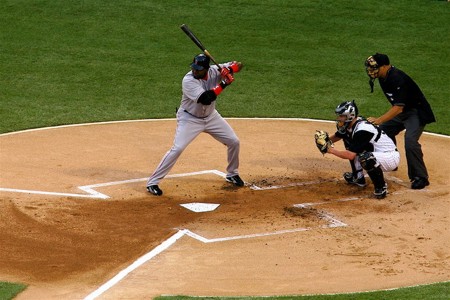-Home- -Intro- -Batter's Perspective- -Fan's Perspective- -The Physics- -Bibliography-
=The Batter's Perspective=

When a 90 mph pitch leaves the
pitcher's hand, the batter has only about half a second to decide
whether or not to swing at the ball. The batter's process for
deciding is divided in three parts, observe, compute, and swing.
First, during the observation period the batter analyzes the pitch and
identifies it. Second, during the compute period the batter
estimates where he needs to meet the ball in order to make contact with
it. And third, the batter has made a decision whether to swing or
not to swing at the pitch. All this takes place in just a
fraction of a second; therefore, the batter must predict accurately
when and where the ball will cross the plate.
Manuel Muñoz - Physics 212
Dr. David Newman
April 2011
Dr. David Newman
April 2011